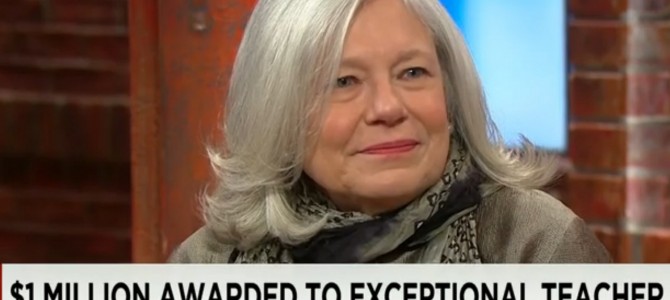
1. Nancie Atwell, Global Teacher Prize Winner, 2015
Last weekend, Nancie Atwell won an inaugural global award that intends to be a “Nobel Prize for teachers.” It comes with $1 million, which Atwell promptly donated to her Maine independent school.
CNN interviewed her upon the occasion, and Atwell let out a number of poignant remarks, including that guttersnipes like Kim Kardashian get constant media attention but teachers and others who perform substantive, socially beneficial work are largely ignored in what passes for our public conversation nowadays. At the end, however, is an honest observation that comes out as a genuine made-for-TV shocker.
“New Day” anchor Alisyn Camerota asked Atwell, “What do you say to kids out there that are trying to figure out what they want to do when they grow up and might be considering teaching?”
“Um, honestly, right now I encourage them to look in the private sector,” Atwell replied. “Because public-school teachers are so constrained right now by the Common Core standards, and the tests that are developed to monitor what teachers are doing with them. It’s a movement that’s turned teachers into technicians, not reflective practitioners. And if you are a creative, smart young person, I don’t think this is the time to go into teaching unless an independent school would suit you.” (Hat tip Shane VanderHart)
2. Stacie Starr, ‘Live with Kelly and Michael’ National Top Teacher Winner, 2014
This was Ohio special-ed teacher Stacie Starr’s reaction to winning a national teaching award last year.
Starr was crying again this spring, not with tears of joy, but in frustration as she announced her resignation due to Common Core. The Chronicle-Telegram reported on her words to a local education forum, where Starr dissected specific portions of example Common-Core tests:
Starr garnered a reputation of being a rock star teacher long before ‘Live with Kelly and Michael’ picked her as the winner of the 2014 Top Teacher Search. She has mentored middle school boys, putting books in the hands of at-risk youth and ties on their necks to foster a sense of pride. Handing out high school diplomas to those same students was a highlight of her career, a testament that getting a child to graduation sometimes requires more than just lesson plans and homework.
She has coached football, taken students on field trips to meet authors and adopted a ‘failure is not an option’ approach to some of the hardest-to-reach students. Yet with a stellar 16-year career under her belt, Starr said the new testing culture is killing education.
‘I can’t do it anymore, not in this ‘drill ‘em and kill ‘em’ atmosphere,’ she said. ‘I don’t think anyone understands that in this environment if your child cannot quickly grasp material, study like a robot and pass all of these tests, they will not survive.’…
‘Each and every day, I have to look in my students’ eyes and tell them I can’t help them because the state has decided they have to prove what they know…It’s just hard because, as teachers, we are playing a game where the rules keep changing,’ she said.
Start at mark 10:12 to view Starr’s summary; the earlier portion of her talk is dedicated to more technical discussion about the tests and their influence on her struggling students.
3. Cynthia Jones, National Teachers Hall of Fame Inductee, 2003
A Fulbright Scholar, Jones was a third- and fourth-grade teacher who specializes in teaching gifted children. She has traveled from her home state of Tennessee to England and Washington DC to present original research. Jones could handle snakes and wild turkeys in her classroom, but Common Core was another thing altogether.
“They’re saying to teachers, ‘This is going to help you,’ no it’s not,” she told me by phone one day, right before skipping off to tutor some students. “They say it’s going to be richer than your paper-and pencil-tests because it’s going to teach higher-level thinking skills. If you’re going to teach higher-level critical thinking, you teach higher-level critical thinking. The only thing I can find in their materials is because they’re going to ask children to write it’s teaching critical thinking skills. No, it’s not. It’s asking children to write a line or explanatory paragraph. None of their major rationales hold water on just a cursory look. It’s bogus.”
Jones’s children got some of the best test scores in her district, yet each year she had to contend with more rules. She was told in a faculty meeting, point blank, to teach to the test. Her administrator marked her down on a teaching rubric after telling Jones she’d taught the best lesson she’d ever seen, but didn’t include written feedback like the rubric demanded, and a written star didn’t count.
“The freedom that teachers usually have in the classroom to create, to be eternal learners, to bring forth the joy of learning, that’s what you want children to have. When everything is so top-down regimented that’s going to stomp on that. I was dreading going to work, I was having a lot of wine when I came home, I was overeating, not sleeping, I kept coming home so upset, and my husband said, ‘You have to stop this or it is going to ruin our marriage.’ This is why I worry about our teachers.”
It was the final straw when Jones’ principal told her to shut down her class garden so the kids could spend more time preparing for tests. Jones quit teaching. Now she mentors student teachers and tutors children, continuing to teach but with more freedom.
Common Core is “just another layer of regimentation to kill creativity, to kill any discretionary powers they have to use the powers God gave them to be a good teacher,” she said.
4. Chasidy White, Nationally and Internationally Recognized Teacher
Alabama history teacher Chasidy White has been recognized by many local, state, and national organizations, including “Teacher of the Year” for the Tuscaloosa County School System in 2012, “Outstanding Leader In Education” from the University of Alabama in 2012, an appointment to Gov. Robert Bentley’s Teacher Cabinet in 2012, several selections for international teacher fellowships, and an appointment to the National Assessment Governing Board in 2014.
White also opposes Common Core. I sat next to her in 2013 as she addressed a crowd of about 600 people to explain why. She’s a bitty lady who had to stand on her tiptoes to see above the podium, but she has the attitude of a Stonewall Jackson. It probably serves her well with her middle schoolers. She calmly, emphatically, and clearly laid out her case against Common Core. This op-ed of hers gives a sampling, as does the radio interview embedded below.
As a teacher, I began to spend nights, weekends, summers, even Christmas Day researching Common Core, because these reforms were so massive and were happening so quickly, it was hard to keep up with how American education was being transformed. I quickly began to realize that the American education system under Common Core goes against everything great Americans like Dr. [Martin Luther] King and President Lincoln ever taught. The very freedoms we celebrate and hold dear are in question when I think of what Common Core means for the United States.
One of my favorite writings about education from Dr. King is a paper entitled ‘The Purpose of Education.’ In it, he wrote ‘To save man from the morass of propaganda, in my opinion, is one of the chief aims of education. Education must enable one to sift and weigh evidence, to discern the true from the false, the real from the unreal, and the facts from the fiction.’
When I sit in faculty meetings about Common Core, I hear ‘curriculum specialists’ tell me that Common Core is here to stay and I must ’embrace change.’ I am forced to drink the kool-aid. These specialists don’t tell us to search for facts about Common Core on our own, they simply tell us what the people paid to promote Common Core want us to know. Didn’t Dr. King want us to separate facts from fiction? Why are we only given information from sources paid to say Common Core is a good thing? Isn’t that the exact same type of propaganda Dr. King discussed in his writings about education? Shouldn’t we discuss why thousands of Americans are calling for a repeal of the standards?
…President Lincoln once said ‘the philosophy of the classroom today, will be the philosophy of government tomorrow.’ With Common Core, new standardized tests have inundated classrooms with problems of their own. Teachers find themselves ‘teaching to the test’ more and more. These tests violate our states’ rights. I wonder if parents realized that all states aren’t created equal in Common Core tests?
5. Jamie Highfill, Arkansas Middle-School Teacher of the Year, 2011
Besides being teacher of the year, Highfill was co-director of Northwest Arkansas Writing Project from 2004 to 2013. She is also a Gulf War veteran who served in the Navy before going into teaching. This award-winning teacher was put on a teacher “improvement plan” in 2013 after voicing her frustration with Common Core to the Washington Post, even though, as Diane Ravitch noted on her blog in 2013, “Her students have achieved outstanding results. According to her profile on the district home page, her students consistently outperform district and state averages, and 77% scored advanced in 2011-2012.”
Because of the improvement plan, Highfill had to begin submitting every day’s lesson plan to a district bureaucrat who also began to visit her class for observations.
“My students, for test purposes, have scored top of the district for the entire time that I’ve been teaching,” Highfill told me, explaining why she knew the “improvement plan” was more about politics than her professional performance. “In that improvement plan, they told me I was not to talk to the media.”
Common Core’s emphasis on nonfiction required Highfill to drop six weeks’ worth of lessons on poetry and a favorite unit on Arthurian legends. She had volunteered to be on a school district committee to help put Common Core in place, but when she learned what it would do to her classroom, she started objecting. It largely started when her school district brought in a consultant to show teachers how to redesign their lessons for Common Core.
“We’d all bring our ideas, and the consultant would consistently say. ‘You can’t use that, it’s not the Lexile level.’ So eventually people stopped suggesting things, what do you suggest, so she pulled out [Malcolm Gladwell’s] ‘The Tipping Point’ for eighth-grade English, which I thought was ludicrous because it is too hard for kids to understand, and then have them write a paper about positive epidemics they could create.”
Beyond requiring children to read more “informational text” (formerly known as “nonfiction), Common Core requires students to read books at or slightly above their reading level, and it recommends using computer programs to determine those levels. The Lexile framework is one such computer program. Common Core itself even shows which Lexile levels compare to which Common Core grade levels (Appendix A, p. 8).
“I tried to infuse as much poetry as I could but it was all about these arbitrary thematic units, and if the students didn’t pick up on that theme that they imposed upon the whole unit, then it was frustrating for them,” Highfill said. “If school is supposed to make students educated members of a specific culture, they need to encounter texts that have cultural information. It’s not just the Lexile level of the text, there’s an underlying meaning underneath the words, of cultural significance. I can read the word ‘Camelot’ when we’re talking about the Kennedy administration, but if I don’t understand King Arthur, how can they understand the significance of that?”
Having an administrator sit in on her classes and approve every lesson plan was too much for Highfill. She handed in her resignation.









